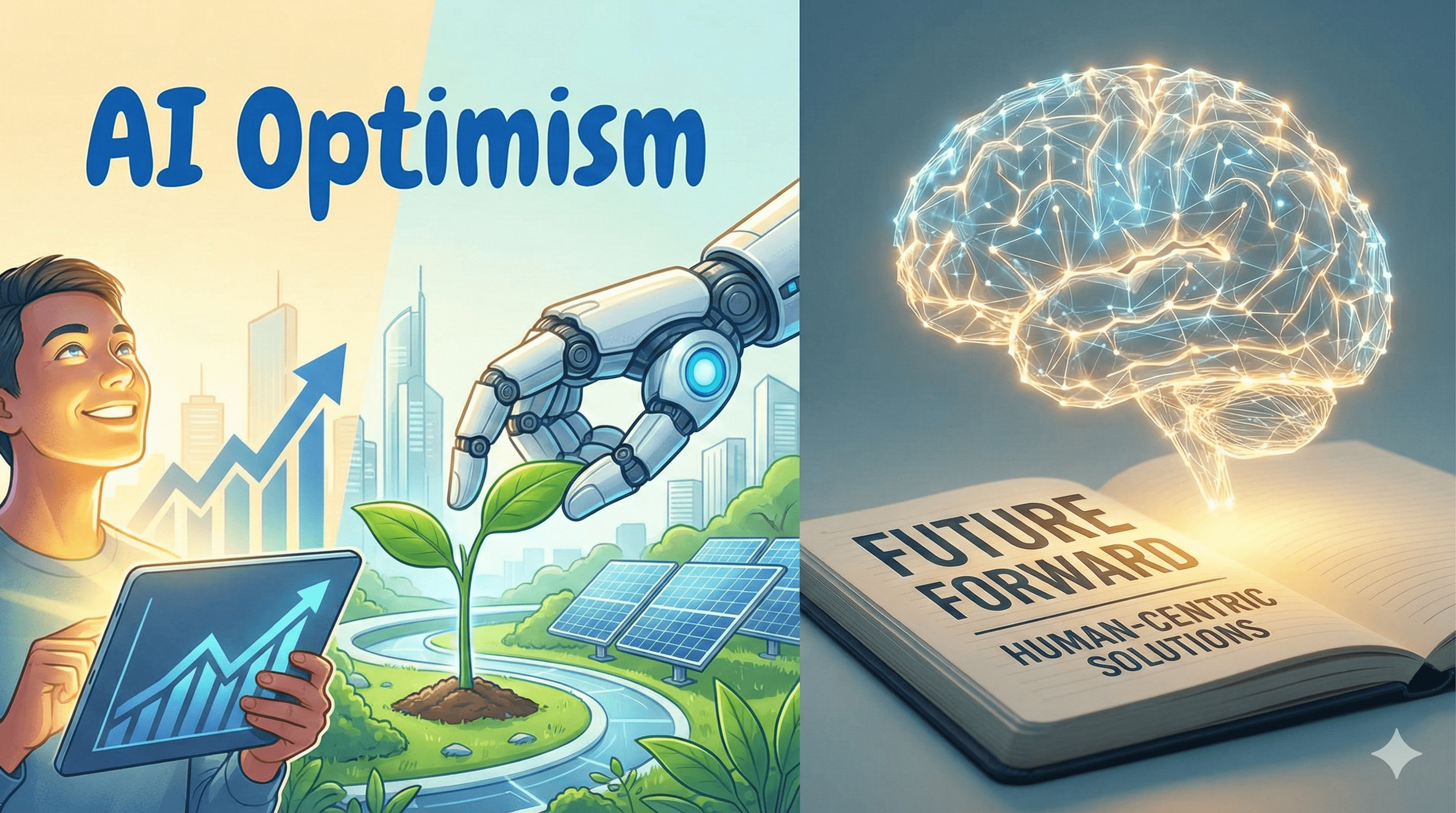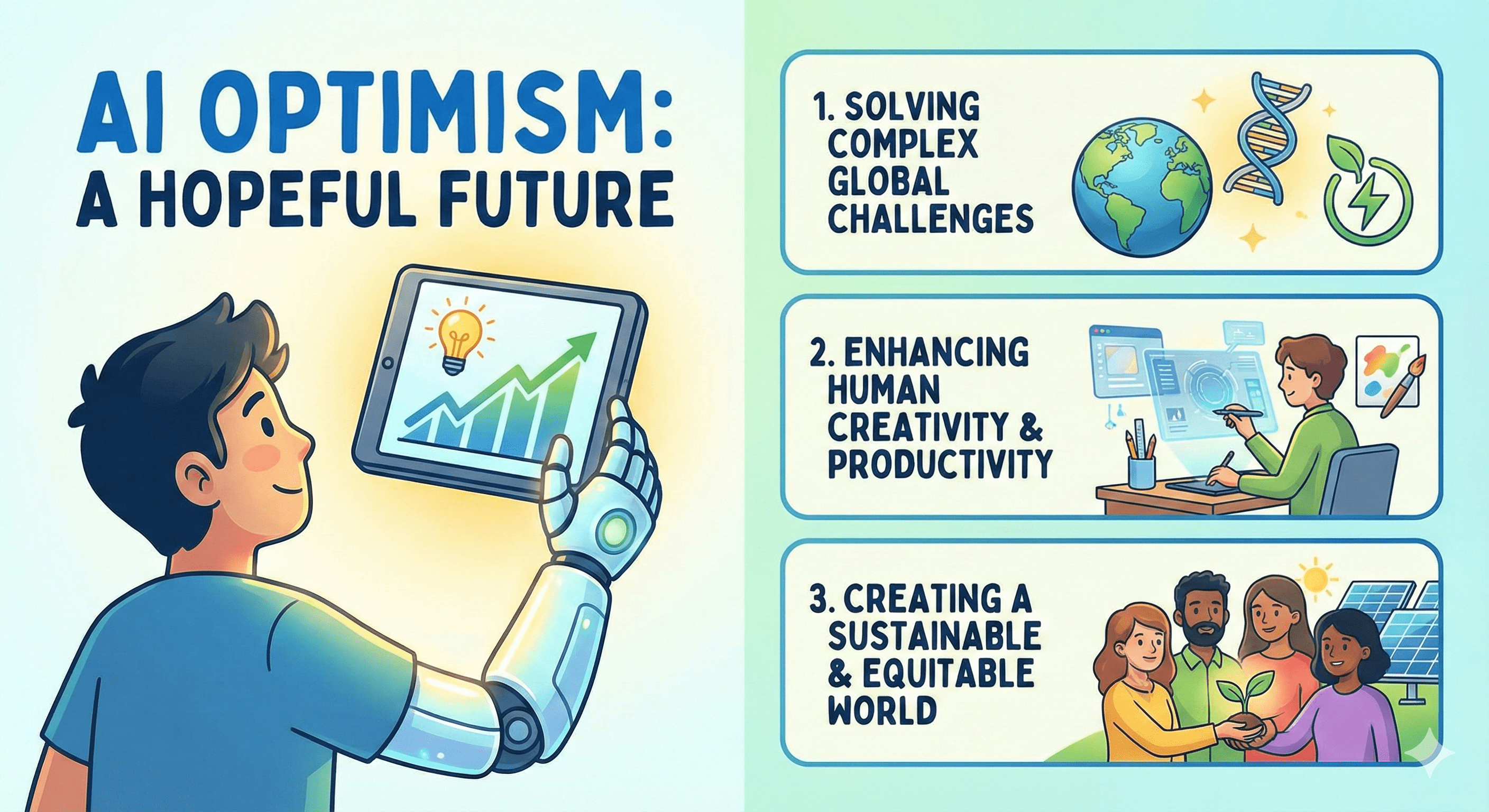If you’ve spent any time online lately, you’ve probably seen a lot of dramatic headlines about artificial intelligence. Some say AI will take all the jobs. Others say it will completely change life as we know it.
What you don’t hear nearly enough is this:
AI is overwhelmingly a story of hope for everyday people.
Not hype. Not doom. Hope.
At AIBeginner.net, that’s our core belief. When you look beyond the noise and into what’s actually happening, a different picture appears: AI is helping beginners feel more capable, creative, and prepared for the future of work.
AI Isn’t Replacing People — It’s Empowering Them
One of the biggest fears you hear is, “AI is going to replace everyone.” But here’s a more accurate, beginner-friendly way to think about it:
AI replaces tasks, not people.
Most jobs are made up of many smaller tasks. Some of those tasks are repetitive, boring, or time-consuming. Those are the parts AI is very good at helping with:
- Drafting emails, outlines, or social posts you can then refine.
- Summarizing long documents so you don’t have to read every word.
- Creating first-draft ideas, lists, or templates to get you started.
- Helping you reword messages so they sound clearer and more professional.
Meanwhile, your uniquely human strengths still matter — judgment, relationships, empathy, creativity, and lived experience. AI is a powerful assistant, not a replacement for who you are.
Everyday People Are Becoming More Capable with AI
For decades, advanced technology mainly helped people who could code, engineer, or design. AI is different. It’s finally making advanced capabilities available to everyday, non-technical people who just want to get more done with less stress.
With today’s tools, a beginner can:
- Build a simple website or landing page in an afternoon.
- Get help writing resumes, cover letters, or professional bios.
- Turn rough notes into polished emails, reports, or lesson plans.
- Brainstorm business ideas, content topics, and marketing angles.
- Automate small, repetitive tasks at home or at work.
You don’t have to “be technical” to benefit. If you can describe what you want in plain language, you can start using AI today.

Optimism Doesn’t Mean Ignoring the Risks
Being optimistic about AI doesn’t mean pretending there are no risks or challenges. It means choosing a practical, informed mindset instead of panic.
An optimistic outlook on AI sounds like this:
- “I want to understand how this works, not hide from it.”
- “I can learn the basics, even if I’m starting from zero.”
- “I want to be the kind of person who knows how to use AI wisely.”
When you stay curious instead of fearful, you put yourself in a much stronger position. You’re able to ask better questions, set healthier boundaries, and make smarter decisions about which tools to use and how to use them.
A Simple, Beginner-Friendly Approach to AI
At AI Beginner, our philosophy is straightforward:
- Anyone can learn the basics of AI.
- Anyone can benefit from AI tools.
- You don’t need to be “a tech person” to get started.
You don’t need to understand how the underlying models or math work. In fact, you can go very far without ever touching code. What matters most is learning how to:
- Write clear, simple prompts in your own words.
- Ask AI to help with problems you actually have in real life.
- Review the answers with a critical, human eye.
- Use AI to save time, not to switch off your thinking.
This is why we design everything at AI Beginner — articles, tools, and the AI Beginner Academy — for absolute beginners. No jargon. No shame. No assuming you “should already know” how this works.
Why the Future with AI Looks Hopeful (Especially for Beginners)
Here’s one of the most powerful truths about AI that we share with new learners all the time:
You are not behind.
AI is still developing and changing quickly. That can feel overwhelming, but it also means we’re early. Many people still haven’t taken their first small steps.
That’s exactly why now is such a good time to learn the basics:
- You can build confidence while expectations are still low.
- You can experiment without needing to be “the expert.”
- You can bring new ideas to your work, business, or community before AI skills are truly everywhere.
Even a basic, beginner-level understanding of AI can help you:
- Have smarter conversations at work.
- Spot new opportunities to save time or reduce stress.
- Feel calmer and more prepared as new tools appear.
If You’re Feeling Overwhelmed by AI, Start Small
If all of this still feels like “a lot,” you’re not alone. Many people quietly feel behind, confused, or even embarrassed to ask simple questions about AI.
The best way to move past that feeling is not to read a 200-page report. It’s to take one small, practical step.
For example, you might:
- Ask an AI tool to rewrite a long email into a shorter, friendlier version.
- Paste a dense article and ask for a 5-bullet summary you can actually use.
- Brainstorm 10 ideas for social posts, lesson topics, or project names.
- Use AI to turn messy notes into a simple checklist or plan.
Once you see how useful that first step is, your fear starts to fade. You start to think, “If I can do this, what else could I try?”
How AI Beginner Supports a Hopeful AI Journey
The entire reason AI Beginner exists is to support people like you — curious, thoughtful adults who want to understand AI without getting lost in technical details.
Our approach is simple and optimistic:
- We focus on real-life use cases instead of abstract theory.
- We break things down into short, clear lessons.
- We emphasize ethics, safety, and boundaries, not just productivity.
- We believe every beginner can build confidence with AI one small step at a time.
If you want more structure, you can explore the step-by-step training inside the AI Beginner Academy, where we guide you through AI basics, prompts, practical workflows, and simple automations designed specifically for non-technical learners.
Quick FAQ: A Hopeful, Beginner-Friendly View of AI
Will AI replace every job?
Very unlikely. AI is strongest at repeating patterns and automating specific tasks. Most jobs involve context, communication, creativity, and human judgment — things AI struggles with. The real shift is that jobs will change, and people who know how to use AI tools will have a clear advantage.
Am I too old or too “non-technical” to learn AI?
No. You can learn AI at any age and from any background. If you can use email, search the web, and type in a box, you can start using AI. The key is finding explanations designed for beginners, not for engineers — that’s exactly what we focus on at AI Beginner.
How can I start using AI without feeling overwhelmed?
Start with one small, low-pressure task in your everyday life: summarizing text, drafting a message, or brainstorming ideas. Once you’re comfortable with that, you can move on to slightly bigger workflows. Small wins build confidence.
Where can I learn AI in a structured, beginner-friendly way?
If you prefer a step-by-step path instead of guessing alone, take a look at the courses inside the AI Beginner Academy. They’re built specifically for absolute beginners who want a calm, clear introduction to AI tools and workflows.
Final Thoughts: The Future of AI Is Bright — and You Belong in It
The future of AI doesn’t just belong to big tech companies or professional developers. It belongs to teachers, small business owners, parents, creatives, office workers, students, and anyone willing to learn.
You don’t need to know everything. You don’t need to move fast or chase every new tool. You simply need to:
- Stay curious instead of scared.
- Take small, practical steps.
- Let AI handle the repetitive work so you can focus on what makes you human.
That’s the heart of an optimistic outlook on AI. It’s not blind positivity — it’s a clear, grounded belief that with the right guidance, every beginner can benefit from these tools.
If you’re ready to start, we’re here to help you every step of the way.
